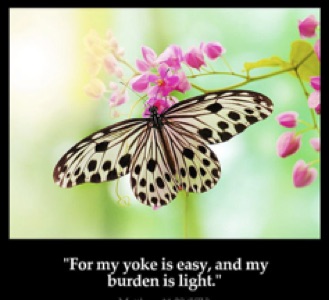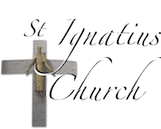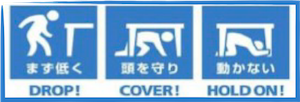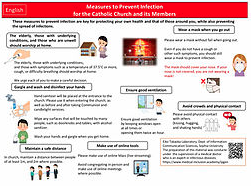“My yoke is easy and my burden light.”
Homily by Fr. Robert Chiesa SJ 14th Sunday Ordinary Time [A] at 12 Noon Mass St. Ignatius Church, Tokyo

I’ve never handled a yoke but I can well imagine what Jesus means when he says his yoke is light. First of all, as a carpenter, he must have made many yokes. I’m sure he always chose very light-weight wood that would not be a heavy burden around the ox’s neck but would keep it lined up with its partner as they plowed their furrow. “My yoke is easy and my burden light.”
But this reference to a yoke is not to make a point about good carpentry. Jesus is referring to the heavy material burdens laid on the shoulders of the poor in his day by heavy taxation and to the heavy religious burdens that educated religious leaders laid on the shoulders of ordinary people, “people of the land” as they derisively called them. Educated religious leaders knew all the details of the Law and prided themselves on observing all 613 of these, but looked down on ordinary people of the world as sinners, because they were unaware of these laws, and even if they did know them, their work and their position at the bottom of the social scale prevented them from observing them. As Jesus says in another place, “They lay heavy burdens on people’s shoulders, but will not lift a finger to move them.” In contrast to the heavy yokes placed on the ordinary citizens of the land by religious and political authoritarians, Jesus’ yoke is easy and his burden is light because, as he says, “I am gentle and humble in heart.”
As we look around at the political authorities in today’s world, such as the G20 that met last week in Hamburg, do we find any who are “gentle and humble in heart”? The best among them may have some trace of the gentleness and humility of Jesus but are often prevented from putting their good desires into practice because of resistance from their own political base or from opposition parties. We need merely recall the troubles caused in Europe by open-door policies toward refugees.
Religious authorities also may try to act and urge others to act with the gentleness and humility of Jesus, but even the Holy Father in Rome meets with internal resistance from his own curia. We must be thankful, however, for the great lessening of religious burdens since the Second Vatican Council. Those of you who are old enough remember the law of fasting from midnight before receiving communion. My grandmother and her friends on their way to morning Mass in San Francisco, where it can be very foggy, would hold handkerchiefs to their mouth so as not to let the fog get in and break their fast. During fast days in Lent, the amount of food allowed for each meal was determined by how many ounces could be taken without being sinful. Or there was also an old saying that there are no venial sins but only mortal sins in the area of sexuality.
Jesus says, “Come to me, all you who labor and are overburdened, and I will give you rest.” What is the “rest” that Jesus offers? First of all, it is the rest we feel when we are relieved of the burdens that have nothing to do with what Jesus came to bring us. Perhaps the heaviest burden is concern for self, for recognition and advancement. Jesus moves us away from self-pity to concern for others. This is what Pope Francis stressed so strongly in last year’s Jubilee of Mercy. When Jesus was challenged by the religious authorities for eating with tax collectors and others who were considered “sinners,” he simply replied, “Go and learn what the Scripture means when it says: I desire mercy not sacrifice.” Let me paraphrase what he says about mercy: I have come not to call people who think they are holy, but people who know they are sinners and have the humility to receive the generosity of God and pass it on to others. Like the tax collector who did not look down on others but stood in the back of the temple praying “Have mercy on me, a sinner.” Like the Good Samaritan who went out of his way to take care of a victim of violence. Or like our prayer: Forgive us our sins, as we forgive others, not judging or condemning them but helping them in their material or psychological needs—unfulfilled expectations, unrelieved guilt, real or imagined hurts, uncontrollable addictions. When we take the time and make the effort to reach out to others to give or receive help, we experience the mercy of God who wants all his children to be free and happy.
The “little ones” were the ones who accepted Jesus and what he stood for. These are the people Jesus thanks the Father for in his prayer: “I praise you, Father, for revealing these things to the little ones.” The learned and the clever who had rejected Jesus were too closed in on themselves to share in these blessings.
In this prayer Jesus also gives us access to God as “Abba, Father”: “No one knows the Father except the Son and those to whom the Son reveals the Father.” I often say that the very essence and kernel of the Christian religion is knowing God as Father. That means being able to face him not as All-powerful Ruler and Judge, but as Father always present to us, helping us to get back up each time we slip or fall and constantly calling us forward to follow his Son Jesus with freedom and joy of heart.
As St Paul taught: “Your interests are not in the unspiritual but in the spiritual, since the Spirit of God has made his home in you.” The Spirit fills our hearts with the gifts of “love, joy, peace, patience, kindness, goodness, fidelity, gentleness, and self-control.” These are the gifts we receive when we follow Jesus and live according to his values, as his companions.

 ENGLISH
ENGLISH  ESPAÑOL
ESPAÑOL 








